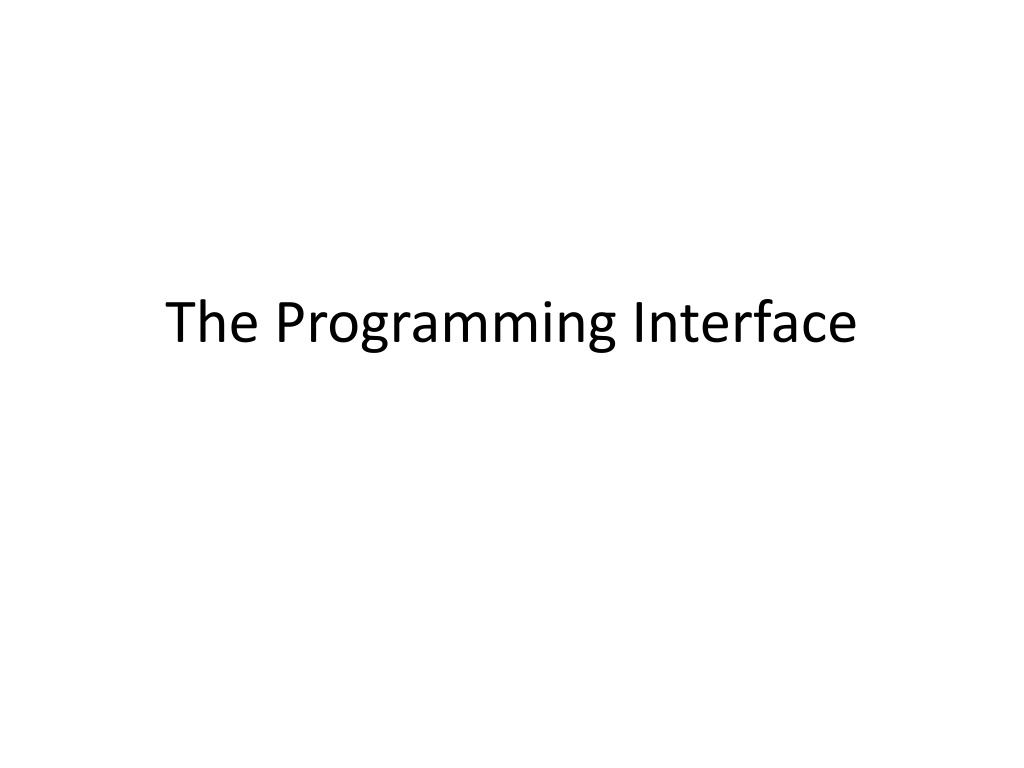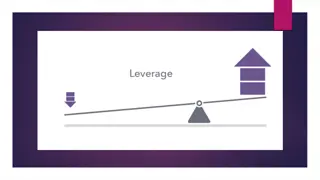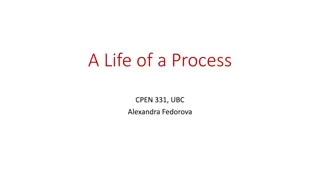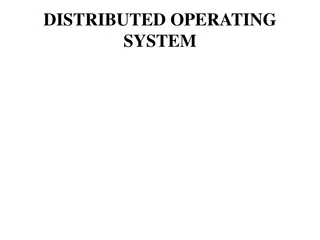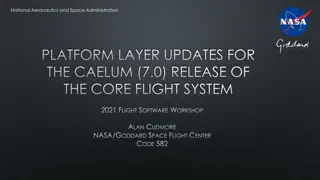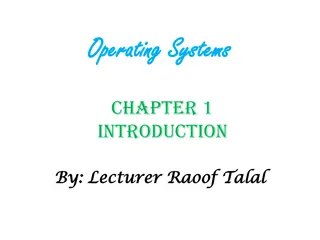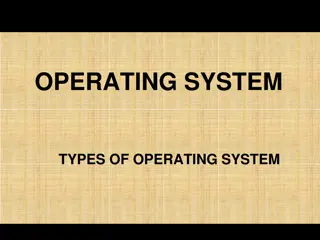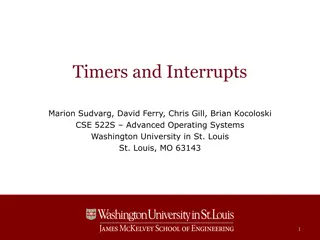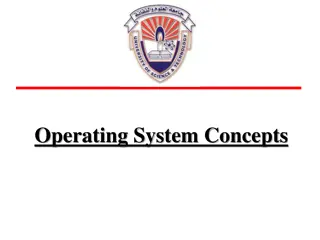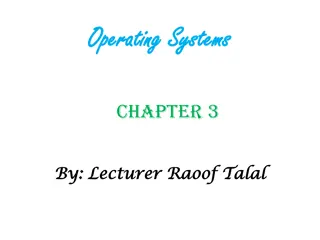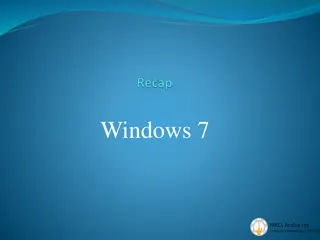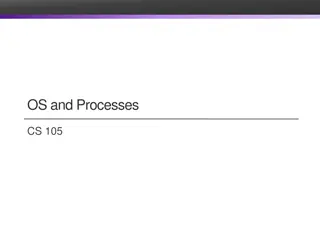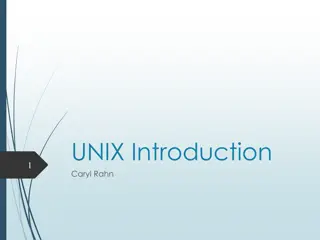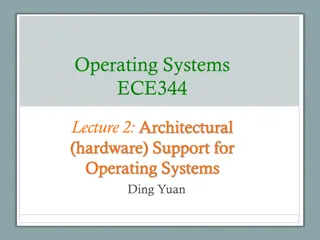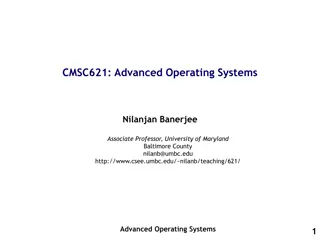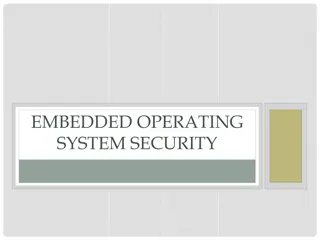Understanding Process Management in Operating Systems
Exploring the core concepts of process management in operating systems, this content delves into the creation, management, and communication between processes. It covers system calls made by shells at user-level, as well as specific examples from Windows and UNIX environments.
Uploaded on Oct 01, 2024 | 0 Views
Download Presentation

Please find below an Image/Link to download the presentation.
The content on the website is provided AS IS for your information and personal use only. It may not be sold, licensed, or shared on other websites without obtaining consent from the author. Download presentation by click this link. If you encounter any issues during the download, it is possible that the publisher has removed the file from their server.
E N D
Presentation Transcript
Main Points Creating and managing processes fork, exec, wait Performing I/O open, read, write, close Communicating between processes pipe, dup, select, connect Example: implementing a shell
Shell A shell is a job control system Allows programmer to create and manage a set of programs to do some task Windows, MacOS, Linux all have shells Example: to compile a C program cc c sourcefile1.c cc c sourcefile2.c ln o program sourcefile1.o sourcefile2.o
Question If the shell runs at user-level, what system calls does it make to run each of the programs? Ex: cc, ln
Windows CreateProcess System call to create a new process to run a program Create and initialize the process control block (PCB) in the kernel Create and initialize a new address space Load the program into the address space Copy arguments into memory in the address space Initialize the hardware context to start execution at ``start' Inform the scheduler that the new process is ready to run
Windows CreateProcess API (simplified) if (!CreateProcess( NULL, // No module name (use command line) argv[1], // Command line NULL, // Process handle not inheritable NULL, // Thread handle not inheritable FALSE, // Set handle inheritance to FALSE 0, // No creation flags NULL, // Use parent's environment block NULL, // Use parent's starting directory &si, // Pointer to STARTUPINFO structure &pi ) // Pointer to PROCESS_INFORMATION structure )
UNIX Process Management UNIX fork system call to create a copy of the current process, and start it running No arguments! UNIX exec system call to change the program being run by the current process UNIX wait system call to wait for a process to finish UNIX signal system call to send a notification to another process
Question: What does this code print? int child_pid = fork(); if (child_pid == 0) { // I'm the child process printf("I am process #%d\n", getpid()); return 0; } else { // I'm the parent process printf("I am parent of process #%d\n", child_pid); return 0; }
Questions Can UNIX fork() return an error? Why? Can UNIX exec() return an error? Why? Can UNIX wait() ever return immediately? Why?
Implementing UNIX fork Steps to implement UNIX fork Create and initialize the process control block (PCB) in the kernel Create a new address space Initialize the address space with a copy of the entire contents of the address space of the parent Inherit the execution context of the parent (e.g., any open files) Inform the scheduler that the new process is ready to run
Implementing UNIX exec Steps to implement UNIX fork Load the program into the current address space Copy arguments into memory in the address space Initialize the hardware context to start execution at ``start''
UNIX I/O Uniformity All operations on all files, devices use the same set of system calls: open, close, read, write Open before use Open returns a handle (file descriptor) for use in later calls on the file Byte-oriented Kernel-buffered read/write Explicit close To garbage collect the open file descriptor
UNIX File System Interface UNIX file open is a Swiss Army knife: Open the file, return file descriptor Options: if file doesn t exist, return an error If file doesn t exist, create file and open it If file does exist, return an error If file does exist, open file If file exists but isn t empty, nix it then open If file exists but isn t empty, return an error
Interface Design Question Why not separate syscalls for open/create/exists? if (!exists(name)) create(name); // can create fail? fd = open(name); // does the file exist?
Implementing a Shell char *prog, **args; int child_pid; // Read and parse the input a line at a time while (readAndParseCmdLine(&prog, &args)) { child_pid = fork(); // create a child process if (child_pid == 0) { exec(prog, args); // I'm the child process. Run program // NOT REACHED } else { wait(child_pid); // I'm the parent, wait for child return 0; } }
